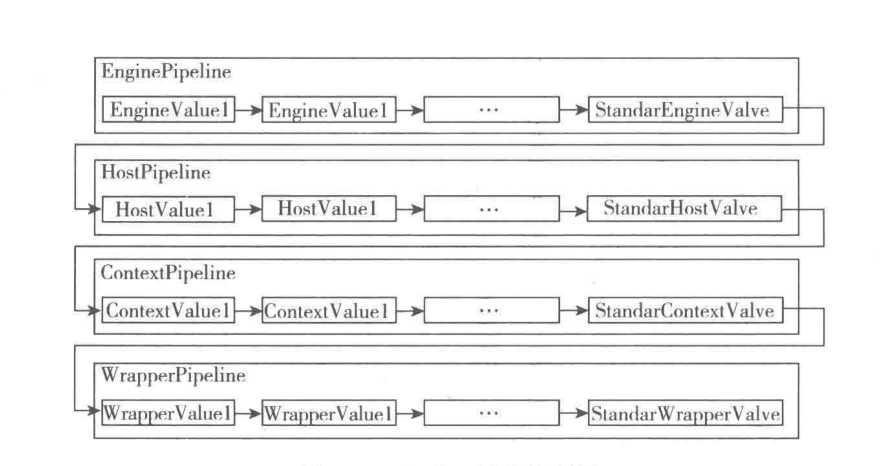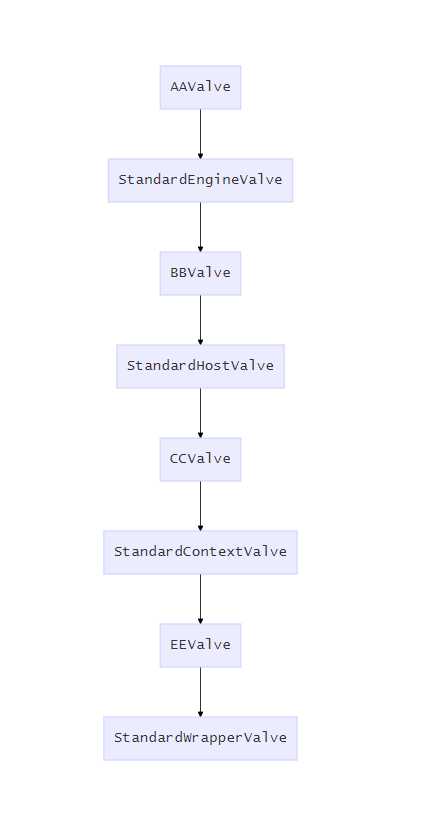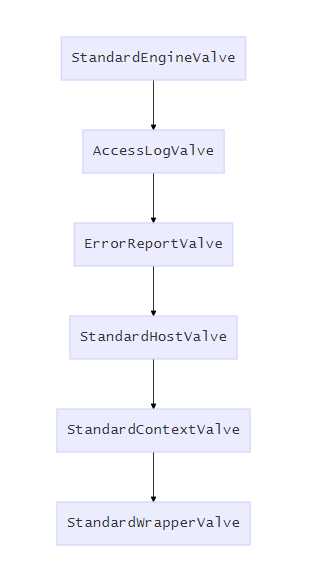标签:ima dea Fix classname 区别 catch try cat map
Pipeline--Valve是一种责任链模式,它和普通责任链模式有两点区别:

? Tomcat按照包含关系有4个级别的容器,标准实现分别是:
请求对象和响应对象分别在这4个容器之间通过管道机制进行传递。

? 在 server.xml 中 配置 阀门:
<Engine name="Catalina" defaultHost="localhost">
<Host name="localhost" appBase="webapps"
unpackWARs="true" autoDeploy="true">
<Valve className="org.apache.catalina.valves.AccessLogValve" directory="logs"
prefix="localhost_access_log" suffix=".txt"
pattern="%h %l %u %t "%r" %s %b" />
</Host>
</Engine>public StandardEngine() {
super();
// pipeline 设置 basicValve
pipeline.setBasic(new StandardEngineValve());
setJvmRoute(System.getProperty("jvmRoute"));
// 设置等待时间 10
backgroundProcessorDelay = 10;
}
public StandardHost() {
super();
// 设置 BasicValve
pipeline.setBasic(new StandardHostValve());
}
public StandardContext() {
super();
// 设置 BasicValve
pipeline.setBasic(new StandardContextValve());
broadcaster = new NotificationBroadcasterSupport();
if (!Globals.STRICT_SERVLET_COMPLIANCE) {
resourceOnlyServlets.add("jsp");
}
}
public StandardWrapper() {
super();
swValve = new StandardWrapperValve();
// 设置 BasicValve
pipeline.setBasic(swValve);
broadcaster = new NotificationBroadcasterSupport();
}
// 在处理 server.xml 中配置的 Valve 时
// StandardPipeline
@Override
public void addValve(Valve valve) {
// 验证 是否可以 绑定 容器(Engine、Host等)
if (valve instanceof Contained)
((Contained) valve).setContainer(this.container);
// 是否有必要调用 start 方法
if (getState().isAvailable()) {
if (valve instanceof Lifecycle) {
((Lifecycle) valve).start();
}
}
// first valve == null,就设置为第一个
if (first == null) {
first = valve;
valve.setNext(basic);
} else {
// 组装成链式结构,first + 新增 valve + basicValve
Valve current = first;
while (current != null) {
if (current.getNext() == basic) {
current.setNext(valve);
valve.setNext(basic);
break;
}
current = current.getNext();
}
}
container.fireContainerEvent(Container.ADD_VALVE_EVENT, valve);
}
// org.apache.catalina.connector.CoyoteAdapter
@Override
public void service(org.apache.coyote.Request req, org.apache.coyote.Response res) {
// 此处调用 Pipeline Value 的 invoke 方法。(Engine是最顶层容器)
connector.getService()
.getContainer()
.getPipeline()
.getFirst()
.invoke(request, response);
}
}
// StandardPipeline
@Override
public Valve getFirst() {
// 如果有注册Valve,就返回
if (first != null) {
return first;
}
// 返回注册的 BasicValve
return basic;
}
// StandardEngineValve
@Override
public final void invoke(Request request, Response response) {
// 根据 当前 request 找到合适的 host,通过 MappingData
Host host = request.getHost();
// 没有匹配的 host, 直接返回
if (host == null) {
response.sendError
(HttpServletResponse.SC_BAD_REQUEST,
sm.getString("standardEngine.noHost",
request.getServerName()));
return;
}
// 判断是否 支持异步
if (request.isAsyncSupported()) {
request.setAsyncSupported(host.getPipeline().isAsyncSupported());
}
// 执行Host的Pipeline
host.getPipeline().getFirst().invoke(request, response);
}
// StandardHostValve
@Override
public final void invoke(Request request, Response response) {
Context context = request.getContext();
if (context == null) {
response.sendError(HttpServletResponse.SC_INTERNAL_SERVER_ERROR,
sm.getString("standardHost.noContext"));
return;
}
// 判断是否 支持异步
if (request.isAsyncSupported()) {
request.setAsyncSupported(context.getPipeline().isAsyncSupported());
}
boolean asyncAtStart = request.isAsync();
boolean asyncDispatching = request.isAsyncDispatching();
try {
context.bind(Globals.IS_SECURITY_ENABLED, MY_CLASSLOADER);
if (!asyncAtStart && !context.fireRequestInitEvent(request.getRequest())) {
return;
}
try {
if (!asyncAtStart || asyncDispatching) {
context.getPipeline().getFirst().invoke(request, response);
} else {
// Make sure this request/response is here because an error
// report is required.
if (!response.isErrorReportRequired()) {
throw new IllegalStateException(sm.getString("standardHost.asyncStateError"));
}
}
} catch (Throwable t) {
ExceptionUtils.handleThrowable(t);
container.getLogger().error("Exception Processing " + request.getRequestURI(), t);
// If a new error occurred while trying to report a previous
// error allow the original error to be reported.
if (!response.isErrorReportRequired()) {
request.setAttribute(RequestDispatcher.ERROR_EXCEPTION, t);
throwable(request, response, t);
}
}
// Now that the request/response pair is back under container
// control lift the suspension so that the error handling can
// complete and/or the container can flush any remaining data
response.setSuspended(false);
Throwable t = (Throwable) request.getAttribute(RequestDispatcher.ERROR_EXCEPTION);
// Protect against NPEs if the context was destroyed during a
// long running request.
if (!context.getState().isAvailable()) {
return;
}
// Look for (and render if found) an application level error page
if (response.isErrorReportRequired()) {
if (t != null) {
throwable(request, response, t);
} else {
status(request, response);
}
}
if (!request.isAsync() && !asyncAtStart) {
context.fireRequestDestroyEvent(request.getRequest());
}
} finally {
if (ACCESS_SESSION) {
request.getSession(false);
}
context.unbind(Globals.IS_SECURITY_ENABLED, MY_CLASSLOADER);
}
}
// StandardContextValve
@Override
public final void invoke(Request request, Response response) {
// 不允许直接访问 WEB-INF or META-INF
MessageBytes requestPathMB = request.getRequestPathMB();
if ((requestPathMB.startsWithIgnoreCase("/META-INF/", 0))
|| (requestPathMB.equalsIgnoreCase("/META-INF"))
|| (requestPathMB.startsWithIgnoreCase("/WEB-INF/", 0))
|| (requestPathMB.equalsIgnoreCase("/WEB-INF"))) {
response.sendError(HttpServletResponse.SC_NOT_FOUND);
return;
}
// 根据当前 request 选择合适的 wrapper、MappingData 设置好了。
Wrapper wrapper = request.getWrapper();
if (wrapper == null || wrapper.isUnavailable()) {
response.sendError(HttpServletResponse.SC_NOT_FOUND);
return;
}
// 判断是否 支持异步
if (request.isAsyncSupported()) {
request.setAsyncSupported(wrapper.getPipeline().isAsyncSupported());
}
// 调用 Wrapper 的 pipeline 处理
wrapper.getPipeline().getFirst().invoke(request, response);
}
// StandardWrapperValve
@Override
public final void invoke(Request request, Response response)
throws IOException, ServletException {
// 分配 servlet 实例处理此次请求
if (!unavailable) {
// 会判断 Servlet 是否有
// ******* SingleThreadModel 接口 ******************
servlet = wrapper.allocate();
}
// 创建 Filter
ApplicationFilterChain filterChain =
ApplicationFilterFactory.createFilterChain(request, wrapper, servlet);
// Call the filter chain for this request
if ((servlet != null) && (filterChain != null)) {
if (request.isAsyncDispatching()) {
request.getAsyncContextInternal().doInternalDispatch();
} else {
// 此处 先调用 过滤器方法,再走service 方法
filterChain.doFilter(request.getRequest(),
response.getResponse());
}
} else {
if (request.isAsyncDispatching()) {
request.getAsyncContextInternal().doInternalDispatch();
} else {
filterChain.doFilter
(request.getRequest(), response.getResponse());
}
}
// 释放 filterChain
if (filterChain != null) {
filterChain.release();
}
// 释放 instance
if (servlet != null) {
wrapper.deallocate(servlet);
}
// 如果不可用,卸载 & 释放 instance
if ((servlet != null) &&
(wrapper.getAvailable() == Long.MAX_VALUE)) {
wrapper.unload();
}
}
@Override
public void doFilter(ServletRequest request, ServletResponse response) {
// 省略部分代码
internalDoFilter(request,response);
}
private void internalDoFilter(ServletRequest request,
ServletResponse response) {
// 省略部分代码,此处转交给DispatcherServlet处理
// We fell off the end of the chain -- call the servlet instance
servlet.service(request, response);
}标签:ima dea Fix classname 区别 catch try cat map
原文地址:https://www.cnblogs.com/wansw/p/10255725.html